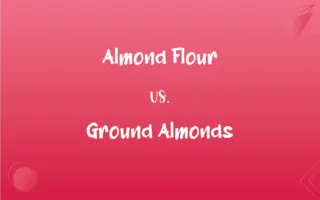Province vs. Territory: What's the Difference?
Edited by Aimie Carlson || By Janet White || Published on January 20, 2024
A province is a primary administrative division within a country, often with self-governing authority, while a territory is a region usually administered by the national government, often with less autonomy.

Key Differences
A province is typically a major administrative segment within a country, often enjoying a considerable degree of self-governance. A territory, in contrast, is usually a geographic area under the administrative control of a country, often with less self-governing power.
In many countries, provinces are integral parts with defined legislative powers and responsibilities, forming a vital part of the national governance structure. Territories, however, may be regions without full legislative autonomy, often governed directly by the national government or a federal representative.
Provinces usually have their own systems of government, including legislative assemblies and distinct laws. In contrast, territories may have fewer legislative rights and are often subject to more direct control from the central government.
The status of a province often indicates a higher level of integration within the nation, with residents typically enjoying the same rights and responsibilities as those in other parts of the country. Territories, however, might have different legal and administrative systems, reflecting their more dependent status.
In terms of representation, provinces are typically represented in the national legislature and may have significant influence on national policies. Territories, on the other hand, may have limited or no representation in the national legislative bodies, reflecting their different constitutional status.
ADVERTISEMENT
Comparison Chart
Autonomy
Often enjoys self-governance
Usually less autonomous
Legislative Power
Has own legislative assembly and laws
Often governed more directly by central government
Integration
Integral part of the country
May have different legal and administrative systems
Representation
Typically represented in national legislature
Limited or no representation in national legislature
Status in National Structure
Higher level of integration within the nation
Often considered more dependent or transitional
ADVERTISEMENT
Province and Territory Definitions
Province
A primary administrative division within a country.
Quebec is a culturally distinct province in Canada.
Territory
A district or area with specific characteristics.
The company plans to expand its territory into Asia.
Province
A region with political and administrative duties.
The province of Ontario is known for its economic contribution to Canada.
Territory
A region designated by boundaries or limits.
The wildlife territory is protected by the government.
Province
A territorial unit within a country or empire.
The Roman Empire was divided into several provinces.
Territory
A realm or sphere of knowledge, activity, or experience.
This topic is outside my territory of understanding.
Province
A geographical area under a country's jurisdiction.
The province's natural beauty attracts many tourists.
Territory
An area inhabited and defended by an animal or group of animals.
The lion marked its territory to ward off intruders.
Province
A realm or sphere of activity or authority.
Quantum physics is well outside my province of expertise.
Territory
An area of land under the jurisdiction of a ruler or state.
The Northwest Territories are a vast, sparsely populated territory in Canada.
Province
A territory governed as an administrative or political unit of a country or empire.
Territory
An area of land; a region.
Province
(Ecclesiastical) A division of territory under the jurisdiction of a metropolitan.
Territory
The land and waters under the jurisdiction of a government.
FAQs
Do provinces have self-governing powers?
Yes, provinces often have considerable self-governing authority.
What defines a province?
A province is a major administrative division within a country.
Can provinces make their own laws?
Yes, provinces typically have their own legislative assemblies and laws.
What is a territory?
A territory is a region under a country's jurisdiction, often with less autonomy.
Are territories directly governed by the national government?
Yes, territories are often directly administered by the national government.
Are provinces considered part of a country?
Yes, provinces are integral parts of the country they belong to.
What kind of representation do territories have?
Territories often have limited or no representation in national legislatures.
Do territories have their own governments?
Territories may have local administrations but usually less legislative power.
Can a territory become a province?
Yes, territories can become provinces through legal and political processes.
Do provinces have fixed boundaries?
Yes, provinces typically have well-defined geographical boundaries.
Is a territory a permanent status?
No, territories can change status, including becoming provinces.
Are provinces autonomous in international affairs?
Provinces generally do not have autonomy in international relations.
Are territories always less populous than provinces?
Not necessarily; population size varies independently of status as province or territory.
Are provinces part of federal systems?
Provinces are often part of federal systems with defined powers.
Are territories always smaller than provinces?
Not necessarily; size varies and is not a defining factor.
Can territories have unique cultural identities?
Yes, territories can have distinct cultural identities.
Do provinces have their own courts?
Yes, provinces usually have their own judicial systems.
Do provinces contribute to national governance?
Yes, provinces often have significant influence on national policies.
Can provinces have their own education systems?
Yes, provinces often control their own education systems.
Do territories have their own taxation systems?
Taxation in territories is typically managed in accordance with national policies.
About Author
Written by
Janet WhiteJanet White has been an esteemed writer and blogger for Difference Wiki. Holding a Master's degree in Science and Medical Journalism from the prestigious Boston University, she has consistently demonstrated her expertise and passion for her field. When she's not immersed in her work, Janet relishes her time exercising, delving into a good book, and cherishing moments with friends and family.
Edited by
Aimie CarlsonAimie Carlson, holding a master's degree in English literature, is a fervent English language enthusiast. She lends her writing talents to Difference Wiki, a prominent website that specializes in comparisons, offering readers insightful analyses that both captivate and inform.






































































